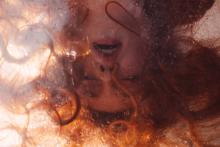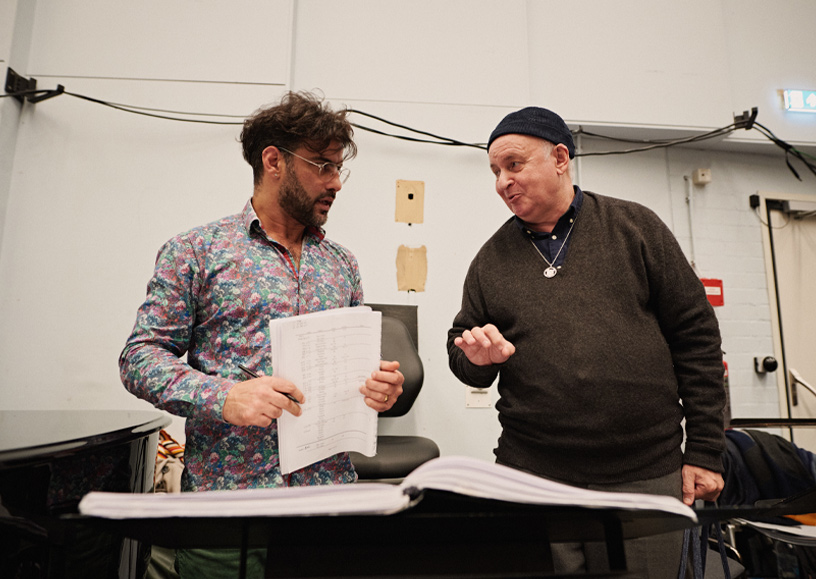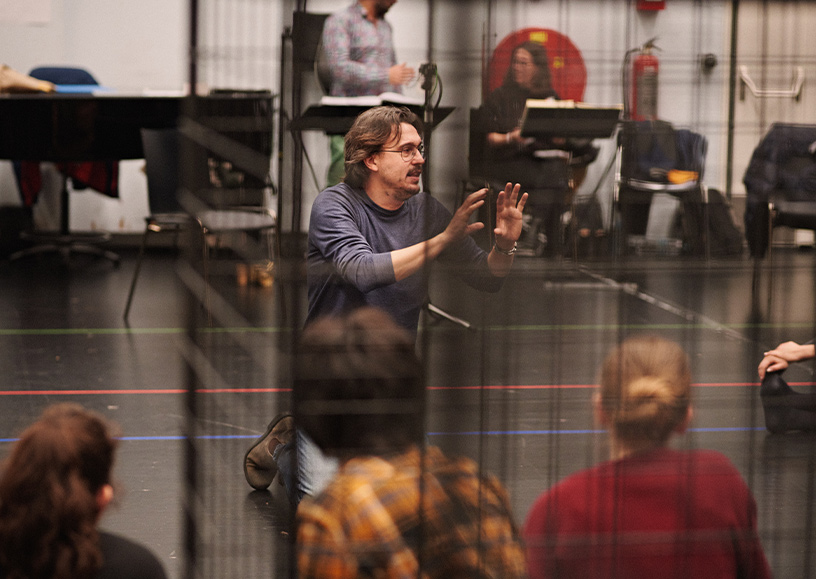Animal Farm

Performance information
Voorstellingsinformatie
Performance information
Duration
2 hours and 25 minutes, including one interval
The opera is sung in English.
Dutch surtitles based on the translation of Maarten van Hinte.
Opera in three acts, nine scenes and an epilogue
Makers
Libretto
Ian Burton and Alexander Raskatov, after George Orwell
Conductor
Bassem Akiki
Director
Damiano Michieletto
Set design
Paolo Fantin
Costume design
Klaus Bruns
Lighting design
Alessandro Carletti
Choreography
Thomas Wilhelm
Dramaturgy
Luc Joosten, Wout van Tongeren
Cast
Mollie
Holly Flack
Young Actress (Pigetta)
Karl Laquit
Blacky
Elena Vassilieva
Muriel
Maya Gour*
Mrs Jones
Francis van Broekhuizen
Clover
Helena Rasker
Minimus
Artem Krutko
Squealer
James Kryshak
Snowball
Michael Gniffke
Benjamin
Karl Laquit
Mr Jones
Marcel Beekman
Boxer
Germán Olvera
Napoleon
Misha Kiria
Old Major
Gennady Bezzubenkov
Mr Pilkington
Frederik Bergman
Two men of Mr Jones
Alexander de Jong, Joris van Baar
Two men of Mr Pilkington
Mark Kurmanbayev, Michiel Nonhebel
Two men from the veterinary car
Alexander de Jong, Mark Kurmanbayev
* Dutch National Opera Studio
Netherlands Chamber Orchestra
Chorus of Dutch National Opera
Chorus master
Edward Ananian-Cooper
New Amsterdam Youth Choir (part of Nieuw Vocaal Amsterdam)
Youth chorus master
Anaïs de la Morandais
Co-commission and co-production by
Dutch National Opera, Wiener Staatsoper, Teatro Massimo (Palermo), Finnish National Opera and Ballet (Helsinki)
Production team
Assistant conductor
Aldert Vermeulen
Assistant directors
Meisje Barbara Hummel
Annemiek van Elst
Diane Clément
Assistant directors during performances
Meisje Barbara Hummel
Annemiek van Elst
Rehearsal pianists
Jan-Paul Grijpink
Irina Sisoyeva
Language coach
Alexander Oliver
Assistant chorus master
Lochlan Brown
Language coach chorus
Brian Fieldhouse
Stage managers
Joost Schoenmakers
Thomas Lauriks
Jossie van Dongen
Marjolein Bergsma
Artistic affairs and planning
Emma Becker
Orchestra inspector
Jurrien Loman
Assistant set design
Gianluca Cataldo
Costume supervisor
Maarten van Mulken
Master carpenter
Edwin Rijs
Lighting manager
Cor van den Brink
Props manager
Niko Groot
First dresser
Sandra Bloos
First make-up artist
Frauke Bockhorn
Sound technician
Ramón Schoones
Surtitle director
Eveline Karssen
Surtitle operator
Maxim Paulissen
Set supervisor
Puck Rudolph
Production managment
Joshua de Kuyper
Chorus of Dutch National Opera
First sopranos
Clarisse Planchais*
Tomoko Makuuchi
Sara Barakat*
Second sopranos
Astrid Joos*
Leo Shibata*
Kristine Paseka*
Mezzi
Hebe Hamilton*
Machteld Vossen*
Sasja Haeck*
Altos
Anna Trombetta*
Ninon Demange*
Itzel Medecigo
First tenors
Tigran Matinyan
Sebastian Brouwer
Raimonds Linajs
Second tenors
Milan de Korte*
John van Halteren
Roy Mahendratha
Baritones
Matthijs Mesdag
Jouke Wijmenga*
Maksym Nazarenko
Basses
Sebastiaan Amerlaan
Berend Stumphius*
Andrew Hopper
*Talent Chorus
New Amsterdam Youth Choir
Part of Nieuw Vocaal Amsterdam
Anna Kemper
Cato Pleijsier
Dalia Kulek
Elizabeth Gerrard
Frances Amado
Laura Nühlen
Lidewij Burgerhout
Miene van Esch
Milan Haver
Misha de Rooij
Sophia van Zuijlen
Teresa Garcia Dueñaz
Thalia Oyewole
Vera ter Keurs
Xenia Wheeler
Zoe King
CONTORTIONIST
Corpus Acrobatics
Li Ling Kassing
Netherlands Chamber Orchestra
First violin
Joe Puglia
Tijmen Huisingh
Beverley Lunt
Melissa Ussery
Vanessa Damanet
Marijke van Kooten
Second violin
Laura Oomens
Olga Caceanova
Siobhán Doyle
Anna Sophie Torn
Catharina Ungvari
Alan Brind
Viola
Luba Tunnicliffe
Gijs Kramers
Berdien Vrijland
Joel Waterman
Ernst Grapperhaus
Judith Wijzenbeek
Cello
Sietse-Jan Weijenberg
Jan Bastiaan Neven
Anastasia Feruleva
Charles Watt
Nil Domènech Fuertes
Nitzan Laster
Double bass
Annette Zahn
Joaquín Clemente Riera
Larissa Klipp
Andreia Rosa Pacheco
Flute
Hanspeter Spannring
Ellen Vergunst
Oboe
Hans Wolters
Yvonne Wolters
Clarinet
Rick Huls
Peter Cranen
Jelrik Beerkens
Bassoon
Remko Edelaar
Jaap de Vries
Horn
Fokke van Heel
Stef Jongbloed
Márton Kóródi
Edward Peeters
Trumpet
Gertjan Loot
Jeroen Botma
Marc Speetjens
Trombone
Harrie de Lange
João Mendes Canelas
Dick Bolt
Hugo van der Wedden (bastrompet)
Tuba
David Kutz
Timpani
Marc Aixa Siurana
Percussion
Matthijs van Driel
Diego Jaén García
Menno Bosgra
Agostinho de Almeida Sequeira
Jan Roel Hamersma
Wilbert Grootenboer
Harp
Saskia Rekké
Kerstin Scholten
Celesta
Celia García-García
Piano
Daan Kortekaas
Saxophone
Marlon Valk
Deborah Witteveen
Electric guitar
Paul van Utrecht
Bass guitar
Patricio Wang
Cimbalom
Dani Luca
The story
Follow the link below to read the story of Animal Farm.
The story
Farmer Jones’ general neglect of his farm leads to a rebellion among the animals. They draw inspiration from the aged pig, Old Major’s, dream of a better life free from oppression by humans. The humans are driven off the farm.
When the windmill is struck by lightning, the pigs claim Snowball is responsible and must be punished. The ‘traitors’ in their own ranks have to stand trial too. Numerous animals confess to bizarre crimes and are executed.
The liberated animals rename the place Animal Farm. They are guided by seven commandments, designed to guarantee that the animals will live as equals and reject the ways of the humans. However, when the tasks are divided it soon becomes clear the pigs have appointed themselves the leaders.
Tensions rise between Animal Farm’s new leaders. In particular, Snowball’s plan to build a windmill sparks a conflict between him and the other top pig, Napoleon. Napoleon persuades the other pigs to side with him and chase Snowball off the farm, after which Napoleon has the windmill built as if it had been his idea all along.
The regime of pigs headed by Napoleon becomes increasingly oppressive. Meanwhile, they keep altering the Seven Commandments to mask their abuses of the system.
After the windmill is rebuilt, Napoleon allows himself to be worshipped as a great leader. Life on Animal Farm is now as tough and as frightening as before the rebellion, but the pigs do their utmost to convey to the other animals that their situation has improved.
An attack on Animal Farm by Pilkington, a neighbouring farmer, is successfully stopped but many lives are lost in the process. A celebration turns into debauchery among the pigs. When the old and exhausted workhorse, Boxer, collapses, the pigs promise to take him to the vet. The other animals know they are lying but feel powerless to act. The Seven Commandments have become worthless and equality is a distant dream on Animal Farm.
‘Opera should be full of life’
Interview with Alexander Raskatov, composer of the opera Animal Farm.
‘Opera should be full of life’
Had you already read Animal Farm when you were asked to turn this book into an opera?
“When the proposal was first discussed, I knew what the book was about but I had never read it. I had read Orwell’s 1984. In the Soviet Union, these books had been strictly banned. When I read Animal Farm, I knew immediately this was about us. Although the Stalinist regime had just ended when my life began — I was born on the day of Stalin’s funeral — the stories were very familiar to me. My grandfather had lived in the Gulag for years and my parents, as medics with Jewish roots, had suffered from Stalin’s campaign against Jewish doctors. That led my father to give up his profession and become a satirical journalist instead. By the time of his death Stalin had made plans to deport Jewish Soviet citizens to the east. So the Stalin era is intimately connected with my personal history.”
You had an important role in the creation of the libretto. What were you looking for in your adaptation of the text?
“I did indeed make changes to the libretto in close consultation with Ian Burton, who produced the first version. When Orwell wrote his book, he did not have all the knowledge we have today about the early years of the Soviet Union. That is why I added various references to the text such as quotes from Stalin, Trotsky and Beria. I modelled the character Squealer somewhat on Beria, who was the head of the state security apparatus, and added a scene referring to how Beria abused his power to force beautiful actresses and other women into intimacies. It is only a short scene but it is important: details like this make the story more lifelike.”
“I also edited the text in other ways. Initially the libretto had narrative passages that made it somewhat ‘oratorio-like’, so I turned that into direct action and dialogues. I looked for stronger contrasts and opportunities for ensembles. I also made the sentences shorter, because I feel opera does not tolerate long phrases.”
“There are three ‘e-words’ that express what this opera should be for me: energetic, eccentric and extravagant. I think it is important that opera communicates with its audience: someone who comes to the performance with no prior knowledge should be immediately touched by the story and the music.”
And how is that reflected in your composition?
“I developed a kind of ‘scalpel style’ for this opera, with short musical lines and sharp contrasts. I also looked for the appropriate musical rhythm. In addition to melody and timbre, it is important to find a rhythm that takes hold of the audience’s ears.”
“I believe we can learn something from the great era of opera of the eighteenth and nineteenth centuries. I greatly appreciate the skills of contemporary composers and the complexity of their operas, but sometimes I wonder if we are not going too far by developing ever more complex musical idioms. Too much information in a short time span can be exhausting. In Animal Farm, I was looking for a way to recover a forgotten syntax of the ‘old’ operas and apply it in a new situation — a way of using melody and rhythm to capture and hold the audience’s attention.”

Does that mean a return to opera’s original simplicity?
“You can also see this as a further development. Since Alban Berg, opera orchestrations have become increasingly complex, but writing for voices is not substantially different from what it was a hundred years ago. I try to bring the voice to the same level as the orchestra. I want to put it in the foreground and make the most of its power.”
“Together, the soloists of Animal Farm can be seen as a kind of vocal orchestra. Hardly any of the roles could be called supporting roles: each character has their own personality and development. I lay awake at night wondering how to find sufficient musical contrast between all those characters. Eventually I found a way. Before I started working on a part, I sat down in a chair and let the scene play in my imagination. That helped me find distinct characters. That’s how each character got their own texture and range, from extraordinarily high to extremely low.”
You have sometimes said that you came to understand the capabilities of the human voice through intensive exposure to Russian folk music. When was that?“It was in the 1970s, and I must have been about twenty years old. As part of our composition studies, we had to travel around Russia with an ethnographer to collect songs. The polyphony of those songs was incredibly complex. Each singer had to be recorded on a separate tape recorder so that we could notate the vocal lines later, and even then it was very difficult to translate the vocals into notes. At that time, I didn’t realise how important this experience would be for my later understanding of the voice and how it works in an ensemble.”
“We visited different places in the Don region over two weeks. I remember four women getting together in the morning with a bottle of particularly strong vodka and a jar of pickles. Each time they sang a song, they drank a glass of vodka and ate a pickle, and we had to join in. Eight times, for eight songs. I asked, ‘Why do you do it like that?’ and one of the women said, ‘Otherwise the song would have no soul.’ Later, when I attended a performance of the same music in a concert hall in Moscow, it didn’t work. It was an interesting concert, but you have to hear these kinds of songs where the people live, where the music lives.”
“After graduation, I had a chance to travel to Magadan, all the way across on the east coast of Russia. That was part of a government programme to get composers’ music heard by workers all over the country. I don’t know if they needed my music there, but for me it was great to get to know that place and hear the music of the nomads who lived there. Only later did I discover how formative these experiences had been. Now that I live in the West, I am becoming more aware of where my roots are.”
And do those experiences shine through in Animal Farm?
“Maybe they do. I don’t know how the brain works and perhaps I don’t want to know. As a composer, it’s important to make a kind of synthesis of your childhood musical memories, the folk music you have come across and the work of composers you admire. All those impressions have to be turned into an idiom that is yours and no one else’s: life experiences transformed into music. For me, those introductions to folk music are as meaningful as the encounters I had with composers like Schnittke and Weinberg.”
“Arriving at such a synthesis is even more important in an opera. Opera is quite different from symphonic work or chamber music: it is not a pure genre. It requires an open mind and a kind of polystylism. You already see that with Mozart – think of the way he interweaves three orchestras in a famous moment in Don Giovanni, or how in Die Zauberflöte he incorporates sound imitations in Papageno’s part. But I am also thinking of the various quotations or allusions to folk music that you find in operas by Russian composers such as Mussorgsky, Tchaikovsky, Rimsky-Korsakov or Shostakovich. You can incorporate all sorts of things in an opera in a new and sometimes totally inverse context, to produce a paradoxical effect. Opera is not a purist or scholastic art form; opera should be full of life.”
Text: Wout van Tongeren
English translation: Clare Wilkinson
The mechanisms of power
An interview with Damiano Michieletto, director of the opera Animal Farm.
The mechanisms of power
It was you who came up with the idea of turning Animal Farm into an opera. As an opera-maker, why were you so keen to adapt this particular work?
“When I first read the book, I wasn’t thinking of an adaptation. But a few years ago, I asked myself: what would provide good story material for an opera? That’s because I think it’s important for opera houses to take risks and present new operas in addition to the existing repertoire. Animal Farm seemed the perfect choice to be adapted as a new opera. The story is simple, a kind of fairy tale, which on closer inspection has many layers dealing with important issues such as power, oppression and propaganda. It is cruel but also contains comic elements. And in addition to the many solo roles, you can also have a choir perform... All in all, it has many good ingredients for an opera.”
“I shared my plan with Dutch National Opera, and they were immediately interested. Soon we found other opera houses willing to co-produce the work, including even the Vienna State Opera. Dutch National Opera put me in touch with Alexander Raskatov. I remember how he looked when I told him I wanted to make Animal Farm: I think he immediately realised that this touched on his own past. We talked about his Russian and Jewish roots, about what he tries to achieve in his operas. I feel we have a very good human connection.”
Orwell specifically refers to the early decades of the Soviet Union in Animal Farm. How time-bound is the story?
“For me, the story definitely resonates more generally. Orwell wrote an allegory about Stalinism in the Soviet Union in the form of a fable. But because of that allegorical form, the story is also about the mechanisms of power. It is about how the establishment tries to protect its position, how propaganda and threats are used to control people, and how power is exercised through terror. We still see those mechanisms at work today.”
“I placed the action in a slaughterhouse rather than on a farm. The characters are here to be killed. They are stuck in cages and dreaming of freedom. Being an animal here means being a slave, being meat, an object in the hands of humans. For me, the slaughterhouse is a metaphor: in this place, there is an obvious need for revolution. The characters rise up to establish a free society, but the mechanisms of oppression re-emerge. Whoever has power tries to keep it, at any cost.”
“At a certain point in the story, the animals ask themselves what they should do with the cows’ milk. That is a key moment. The pigs say, ‘we are doing important work, we have the biggest responsibilities. If we are not in good shape, we can’t hold off the attacks of Jones and Pilkington, the hostile farmers. So the milk is for the pigs.’ The pigs play on the fears of the other animals and thus begin to grow into the new dictators.”

In your staging, the characters gradually lose their animal-like appearance. Why did you do that?
“Orwell’s book ends with a scene where the other animals peer into the farmhouse where the pigs have holed up, and they see that the pigs have started to look like the humans. In this production, the entire slaughterhouse has been transformed into a posh place and all the surviving characters on stage have become human. They enjoy themselves at a luxurious feast where animals are consumed. All their initial ideals have been forgotten.”
This is a significant difference in perspective: whereas Orwell describes the ending from the point of view of the oppressed, this opera production actually puts the rulers centre stage. In the book, we remain outside the house of the pigs, so to speak; you take the audience inside, which is perhaps even more disturbing. “For me, it’s about showing the two sides. First the animals are the focus, and at the end you see the humans eating the animals. First you see those who suffer, then those who oppress them who get to decide whether they live or die. These are the two sides of oppression. But it is also more subtle: think of the difference between the people who read newspapers and the people who print them, the people who believe what they are told and the people who want to control the minds of others through the media. All these mechanisms of power are what I am interested in. Ultimately, in this production, the victims of the regime disappear from view, like the people who disappeared into the Gulag in Russia, and perhaps also like the victims of our own prosperity who often remain invisible to us.”
What do you want this opera to do to your audience?
“When Kafka was asked what he wanted his work to achieve, he replied that a book should be like an axe for the frozen sea within us. I think that’s a good image for the effect an opera like this should have. The performance should cause a deep vibration. The fact that it is a live event helps. We live in a society that is increasingly digital. Of course we need digital technology, but what theatre provides is a live experience in which the audience can participate. And the more you have something provocative to offer, the more audiences will want to come to the theatre. The performance is a provocation, and I mean that positively: it resonates with something deep inside. In theatre, when you bring all the elements together — the story, the live music, the cast, the set design — something magical happens. The performance can be violent, but there is also beauty, enchantment. It is an event that makes you cry and laugh, that takes your breath away — because what you see is real.”
“I think the audience will be gripped by this story and by Raskatov’s music. My greatest hope is that I have started the creation of an opera that will be staged and experienced in numerous ways in the future.”
Text: Wout van Tongeren
English translation: Clare Wilkinson
Programmaboek
Become a friend of Dutch National Opera
Friends of Dutch National Opera support the singers and creators of our company. That friendship is indispensable to them and we are happy to do something in return. For Opera Friends, we organise exclusive activities behind the scenes and online. You will receive our Friends magazine, have priority in ticket sales and a 10% discount in the Dutch National Opera & Ballet shop.
